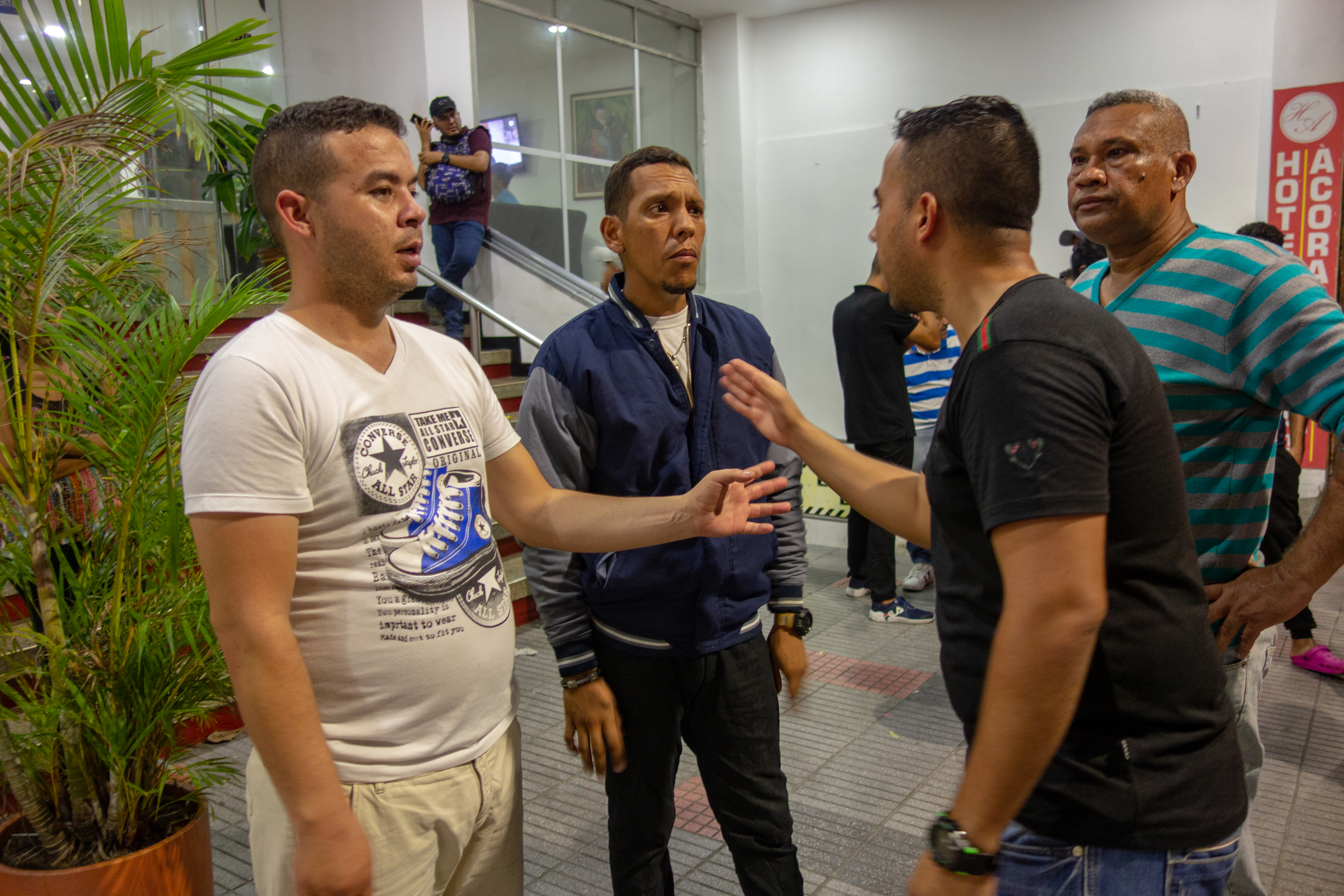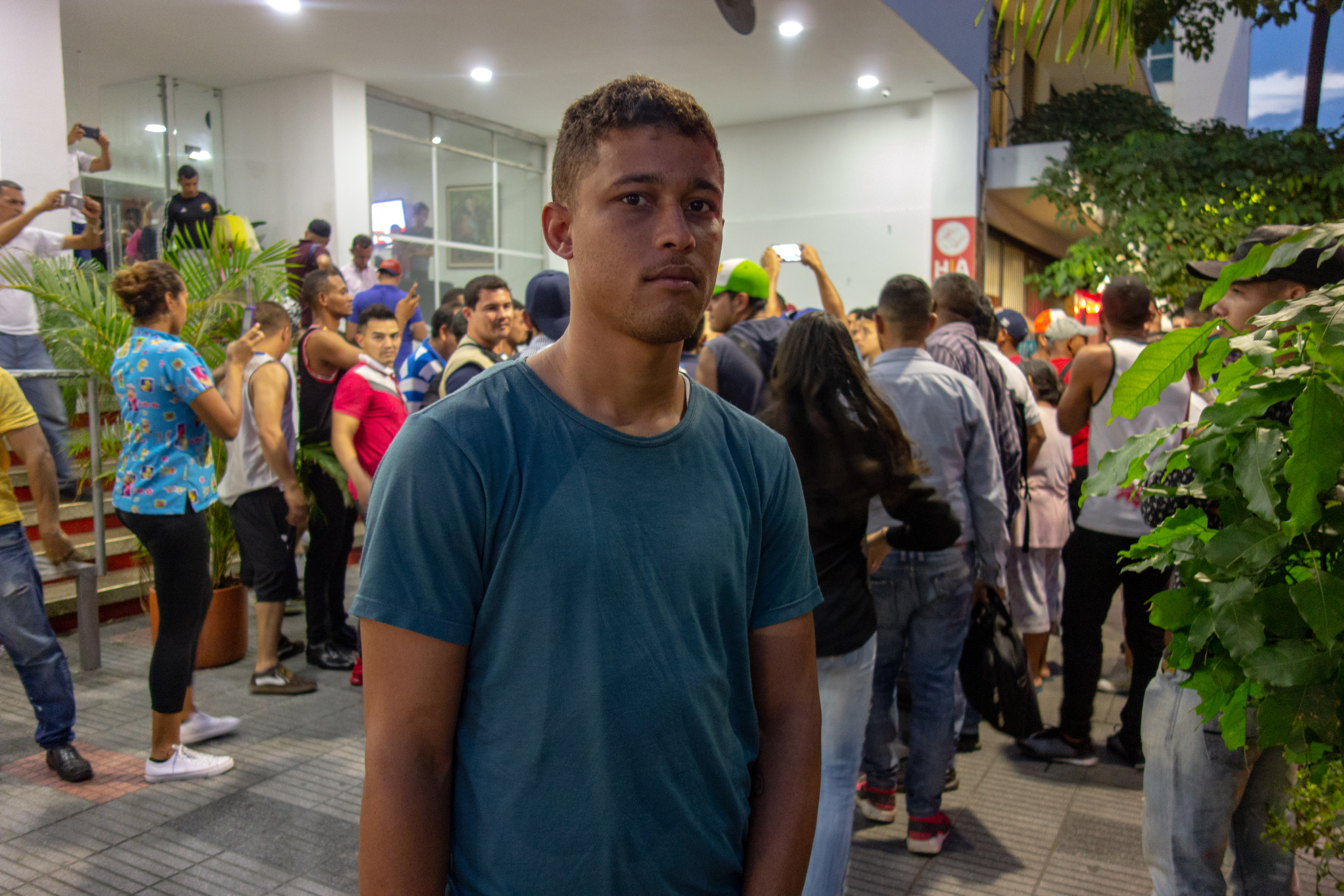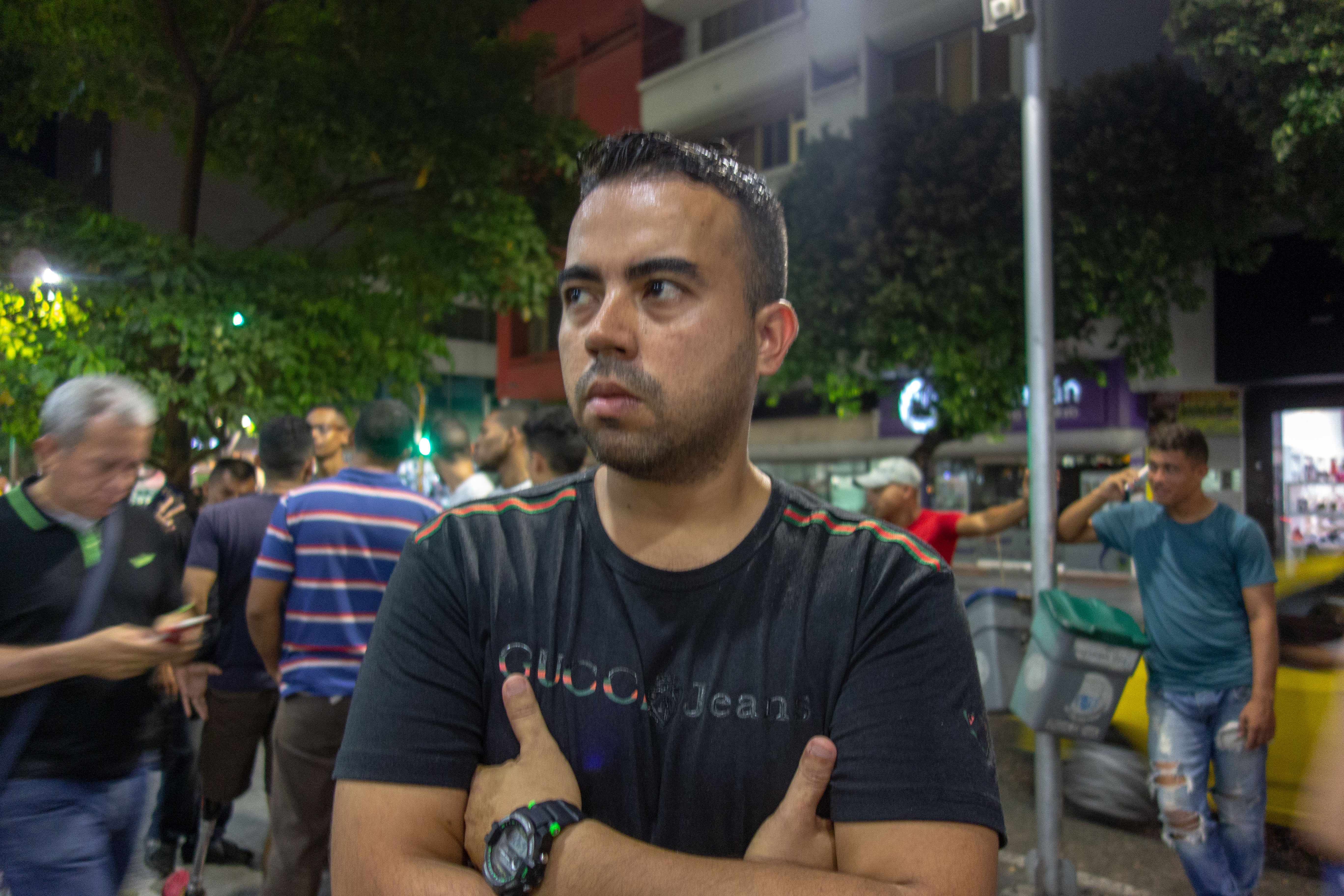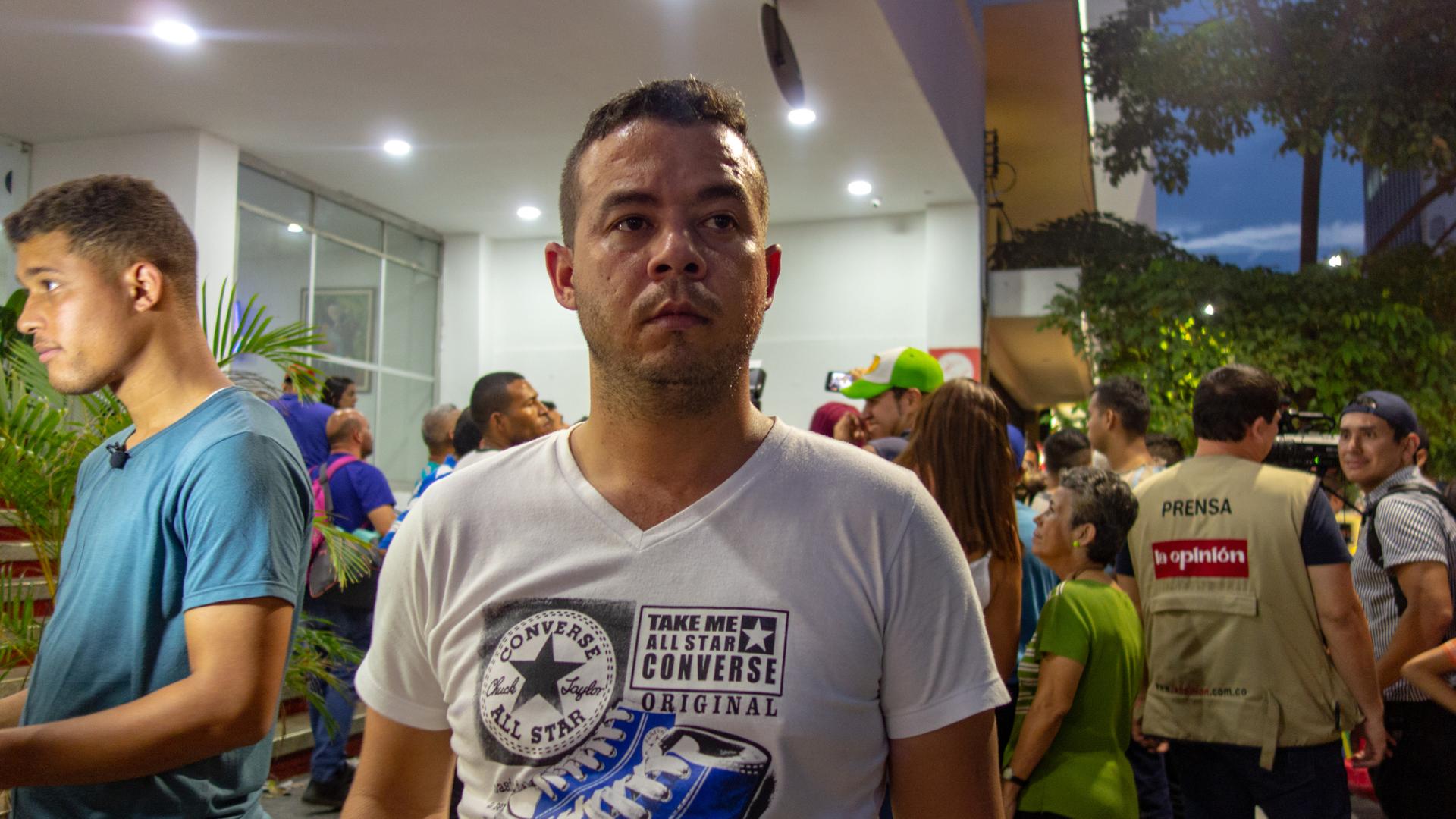Venezuela’s ex-military deserted Maduro hoping for a revolution. Now they’re on the brink of homelessness.
Venezuelan Frank Rengifo left his military post as a sergeant in March, walking across the border to join other military and security forces with whom he hoped to later overthrow President Nicolás Maduro. The bold move put his family at risk of repercussions. He is now languishing in Cúcuta far from his family and struggling to get by. Juan Guiadó and his opposition members have “disappointed him.”
When Venezuelan Sergeant Frank Antonio Rengifo deserted his military post in early March — walking across the border into neighboring Colombia — he thought he’d soon play a role in an armed revolution to end the Maduro regime.
Rengifo’s journey to the border town of Cúcuta, Colombia, put his life — and those of his family — at risk, but united him with hundreds of military and security officials who have already taken the same bold decision.
Together, they intended to heed the call of self-appointed interim President Juan Guiadó to march back into Venezuela and bring Guiadó to power, removing President Nicolás Maduro, whom they see as a tyrant.
Related: As Venezuela’s crisis worsens, thousands flee to Colombia
Nearly three months on, however, the scenario seems little more than a dream.
Instead of changing history, Rengifo is living a life of monotony, disappointment and frustration out of a budget hotel — far from his wife and three daughters, who struggle to make ends meet.
Over 1,400 defectors and their families are holed up in hotels in Cúcuta, where they are registered as asylum-seekers, according to Colombia’s migration authority. Their lodgings and three meals a day have been paid for by the United Nations High Commissioner for Refugees along with the Venezuelan opposition.
Related: Venezuela was once the richest, most stable democracy in Latin America. What happened?
But now, neither the UN nor the opposition can afford the bills and will no longer pay for lifelines like shelter and food.
On May 14, Colombia’s migration authority informed them that their time in limbo is up: They will be given work permits and must seek jobs. Once they receive the right to work and other benefits, they will lose their asylum and will have one week to evacuate the hotels or assume responsibility for payment.
“The interim president has let us down,” Rengifo said, stood in front of his hotel in the traffic-congested center of the humid border town. A skinny young man in a T-shirt and jeans — stripped of his military uniform — his words alone give away his military past.
“Guiadó called on the armed forces because we are the ones who have the weapons, the training and the ability to confront what’s happening in Venezuela. What are we waiting for?!”
“Guiadó called on the armed forces because we are the ones who have the weapons, the training and the ability to confront what’s happening in Venezuela. What are we waiting for?!”

‘Thrown out onto the streets like dogs’
Guaidó invoked the constitution on Jan. 23 to justify his declaration as Venezuela’s legitimate leader. He vowed to replace Maduro, who secured his second presidential term through what many call fraudulent elections.
Since that day, the young politician repeatedly called on the Venezuelan military to put themselves on “the right side of history” and desert their posts.
Over 1,400 have answered that call since Feb. 23, the same day as Guaidó’s US-backed, failed attempt to push aid into Venezuela, says Colombia’s migration authority. Most say they offer their unwavering support — and potentially their lives — to the opposition.
Many say they can no longer follow reprehensible orders to oppress people and commit human rights violations or and can longer endure Venezuela’s dire living conditions and rapid demise under Maduro.
The army has threatened or pushed out those deemed unloyal to the Chavista revolution, which some described as a “narco-dictatorship,” referring to a mafia state run by paramilitary and guerilla groups that profit from drug trafficking.
These defectors are now scattered across Colombia — accompanied by a total of 675 family members who made the trip with them to avoid repercussions and suffering back home.
Over the last three months, confusion erupted over who would cover the defectors’ basic needs. One hotel regularly threatened to evict a group of 77 military officials and 91 family members due to Guaidó’s disorganized administration’s failure to pay on time.

A lack of medical care for the sick or diapers for young children has left the men begging — something completely unforeseen that chips away at their dignity, said 23-year-old soldier and father of two Nikol Páez.
Far from their families and former responsibilities Paez says they feel like they are “lost on Jupiter.”
“While they are enjoying their fancy hotels we are being thrown out onto the streets like dogs,” Rengifo said, incensed by Venezuela’s National Congress members who stay in Cúcuta’s high-end international hotels while he shifts from room to room with his possessions.
The decision, signed between the Colombian government and Venezuelan opposition, is another blow to the hundreds of already desperate young men.
“If they give me a roof and three meals a day I will be here until the regime falls.”
“If they give me a roof and three meals a day I will be here until the regime falls,” said Jefferson del Río, a former sergeant with thirteen years of military service, on May. 3. But two weeks later, exasperated, he is now considering leaving Cúcuta for another Colombian city with better job prospects.
A number of soldiers and National Guard members said they were also considering moving to Chile, Ecuador or Peru. They expect others to follow suit, leaving Guaidó’s bastion of support scattered across Latin America.
“The ambassador [Humberto Calderon Bertí] says we are fine, but it’s a lie: He has not even had the decency to come and speak with us,” del Río says, showing a picture of himself clutching his one-year-old daughter. “We don’t want to stay in other countries; we want to return to our houses and our jobs.”
Bertí, Guiadó’s ambassador to Colombia, was contacted but was unavailable for comment.

‘Expectations’
Most of the deserters have become idle and jaded as their long days of rigid military routines and rules have been swapped for drab cycles of sleeping, watching television, eating and sleeping again. Having once been the enforcers of national law and order, they are now helpless, living on handouts, Rengifo says.
But most of all, they are frustrated that the call to arms they had dreamt of never came.
“Guaidó called on us to take this step, but now they won’t let us do our work as soldiers. We feel like tricked children.”
“Guaidó called on us to take this step, but now they won’t let us do our work as soldiers. We feel like tricked children,” said a former member of the National Guard who wished to remain anonymous for fear of retaliation to himself or his family.
Many arrived in Colombia with false expectations, says Felipe Muñoz, adviser to the Colombian presidency on the Venezuelan migration crisis.
“From the beginning, we have been trying to protect people and meet their needs. Perhaps they have other expectations, but we have to deal with them within a legal framework and that means them not having weapons, uniforms or posing any security issues,” the border chief says.
The deserters have repeatedly called for arms, but on the day of Guaidó’s failed uprising, the group was turned away by the Colombian police when they rushed to the border, poised for action: The Colombian government says it cannot be seen to be launching an armed invasion from its soil.
“From the beginning, we have been trying to protect people and meet their needs. Perhaps they have other expectations, but we have to deal with them within a legal framework and that means them not having weapons, uniforms or posing any security issues.”
Over 1.2 million Venezuelans have now fled to Colombia in search of work and basic goods largely unattainable back home due to shortages or unaffordable due to rampant hyperinflation. That number could reach 4 million by 2021, according to Colombia’s Foreign Minister Carlos Trujillo.
Venezuela’s opposition reached another impasse when their uprising on April 30 fizzled out and left a number of lawmakers seeking refuge in Caracas’ embassies. The US refuses to rule out military intervention, but the opposition is currently discussing potential peaceful resolutions in talks with Maduro’s camp in Norway.
Meanwhile, according to migration officials, a group of undercover infiltrators has been sent to sabotage the opposition from the inside and foment discontent and divisions. This has been corroborated by a number of the deserters themselves.
Related: Venezuelans cartoon their country’s crisis
Officials have threatened to sanction five ex-military and police after drunken scuffles with security at their hotels and accusations of spreading incendiary “fake news.”
Colombia’s intelligence services interviewed every deserter, stripped them of their uniform and weapons upon arrival in Colombia and continue to monitor them, but 10-12 are under “much closer surveillance,” Muñoz says.
Several former soldiers and police say that back in Venezuela, the majority of the military does not support Maduro but are kept in line by fear of violent repercussions. Should the deserters ever make the move, they are confident their ex-comrades will stand down or join them to take Venezuela.
But the discussions over which strategic military bases or border crossings they could invade — should that day come — are waning. A growing number concede that their time has passed to make a revolutionary move. Instead, Rengifo and some of his comrades are hoping military action will come from elsewhere — and soon.
“We don’t want another country to invade, we want to do it ourselves, but it has to happen,” he says. “If we wait any longer the country is only going to fall further into pieces.”
Luke Taylor reported this story from Cucúta, Colombia.
